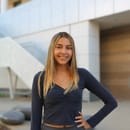Meet Dr. Lane: Your Guide to Navigating Politics in a Digital Age
In the heart of UCSB, Assistant Professor Dr. Dan Lane is making strides in the research literature for political communication and how it relates to intergroup communication and technology. With the 2024 Presidential Election approaching, Dr. Lane, Director of the UCSB Digital Political Inequality Lab, recently presented his ongoing research projects and findings to UCSB Lambda Pi Eta chapter members and any other UCSB students interested.
According to Dr. Lane, the United States of America is currently facing a “democratic crisis” and “democratic backsliding.” He adds, “Even if we have democratic elections, we can still have erosion of those other things that keep democracy running.” Some examples Dr. Lane highlights are losing the peaceful transfer of power during the Presidency, institutions weakening, voting officials being threatened or attacked for doing their jobs, or disproportionately gerrymandering districts.
With this context, one of Dr. Lane’s questions is, “How do we think about digital politics during times of a Democratic Crisis?”

From Political Issues to Group Identities: Dr Lane’s 1st Project
Dr. Lane’s first research project focuses on how we can center groups in political communication and change the way we view political communication. He uses the concept, of “identity turn” to describe how people sometimes pick their political party through their deeply held group identities instead of focusing on facts and policies. He adds that an identity turn highlights politics from a group perspective, explaining this rationale for when we see people supporting something questionable or morally wrong.
For this study, they compared two New York Times articles, one titled, “Many Gen Z Men Feel Left Behind: Some Seek Trump as Answers” and the other one titled, “These Young Women Didn’t Want to Vote for Biden, They’re All in for Harris.” This content analysis shows that by highlighting gender, the articles might influence people to support whichever candidate their gender identity is supporting.
Their findings suggest that group identities are an integral part of politics rather than people deriving their political parties from their views on issues or policies.
How Media Shapes Our Political Identities: Dr. Lane’s 2nd Project
Dr. Lane’s second study looks at the same idea of an “identity turn” but focuses on how it relates to Partisan Social Sorting Theory. This theory describes when we have an alignment between our social and political identities, it turns into these mega identities, and when this alignment occurs, it’s called, “social sorting.”
The first part of their survey figured out how aligned their social and political identities were, finding the highest level of social sorting was almost exclusively for people interested in politics and consumed a lot of media.
The second part of their survey looked at people’s media diets to see how they correlated with their level of social sorting. They discovered social sorting was lowest among people who had minimal media use. They also found that no matter if people were strongly committed to their political party or only loosely aligned, they all reported similar levels of media use.
Dr. Lane and his group also found people who watched media different from their political identities were the least socially sorted group out of them all.
Where Do We Go From Here?
As Dr. Lane wrapped up his presentation, he closed off with the main idea from his studies, “Media gives people vastly different perspectives — each person has a different version of politics and what it means in our head based on the groups we belong to and the social environments we’re in.”
It’s a great reminder to see how the bigger picture of groups can explain the current party polarization in the nation. “There’s gonna be a lot of sadness, frustration, anger, (but) also joy and excitement, no matter how the election goes. And those emotions are important, but also what do you do with those emotions?” Dr. Lane says, “Does that fuel you to do something productive? Or does it just make you feel terrible?”
No matter the election’s outcome, Dr. Lane encourages students to take a break and remind themselves that social change happens slowly but that students can re-approach their perspective and continue to act as productive citizens to empower themselves and their local communities.




